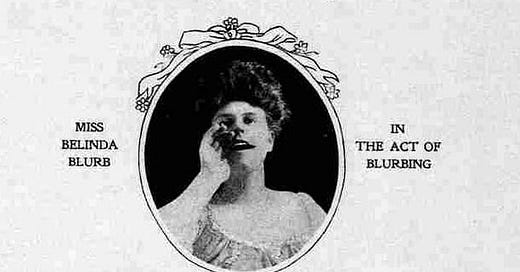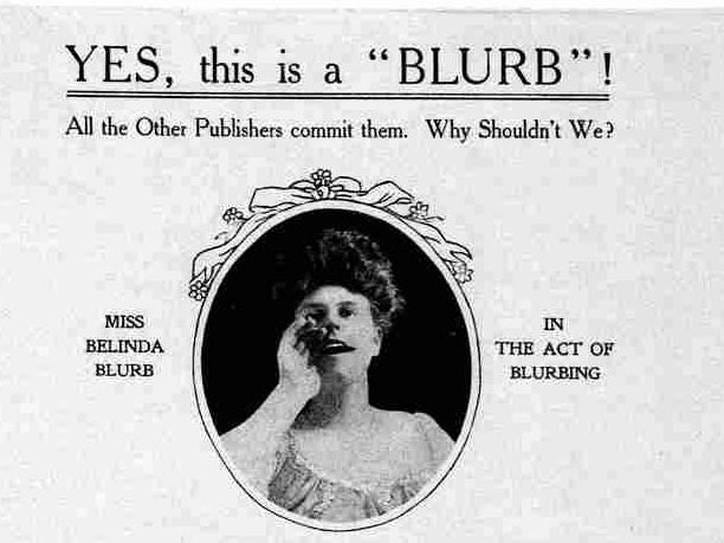How to puff yourself up with blurbs
Why it's good to execute on your marketing plan long before you're ready.
Over the last year or so, I’ve written a loose series about traditional book deals and how to get one:
This new post wraps up the series. It covers one more essential element that I believe helped me get a trad book deal back in 2019—an element which led to the release of my debut in 2021 and which I wish someone had told me about a lot earlier along. So here I am, telling you.
Let’s talk about blurbs, bay-bee.
A long time ago (longer than seems possible), my high-school theater teacher called out our names and forced us up on stage, one by one. The assignment was to “sell a song,” which apparently is the theater term for going all out, singing like you mean it, maybe dancing, or at the very least, gesturing a bit.
What a nightmare. My level of musical talent is like the national debt. It’s actively negative, constantly plummeting even deeper into the red. To my great shame, I can’t dance. I don’t understand what key, pitch or tune even are. And now, all these years later, if I want to raise my own blood pressure, I can remember heaving myself up onto the stage and half-mumbling, half-shouting a Beatles song.
It’s hard to screw up “When I’m 64.” Yet I managed.
Meanwhile there at the back of the auditorium was this self-styled Holden Caulfield, a guy who I’d been obsessed with before we started dating, who quickly dumped me once we did start dating, and who then moved in on my friend Brandy within like three days. He was making a big production out of trying not to laugh, and the whole time my heart was breaking as only a 16-year-old’s heart can.
But selling yourself is embarrassing enough all on its own.
You don’t need some callous heartbreaker snickering behind his fist. It’s embarrassing even to talk about this stuff. Gauche. Gross. Uncool as it gets. Sales are the flyover country of the arts.
And in almost exact proportion to how unspeakable this stuff is, it’s THAT important. It’s THAT crucial to learn how to sell your work. Correspondingly, sales tactics are an extremely important thing to discuss and a vital set of skills to develop. I don’t like this, but I think about it all the time, and as you will have noticed if you’ve been reading this newsletter a while, I’ve become kind of evangelical about it.
In the literary world, there’s a certain tried-and-tested sales tactic, known as the “blurb.” In case that term is new to you, a blurb is a compliment about your work that you request from someone and then show to as many other people as possible. So blurbs are obviously cringe right out of the gate.
It’s fully bad enough to solicit praise. Do we like people when they fish for compliments? Do we like ourselves when we’re fishing? No. To first solicit a compliment and then publish that compliment for all to see is so much worse.
Plus, a lot of tacky and shameless parties use blurbs. Politicians use blurbs and call them endorsements. Marketers splash around the testimonials, calling them “social proof.” What’s behind this widespread adoption? It’s because blurbs work. People have used blurbs for hundreds of years.
Beowulf probably had a blurb. The I Ching probably did, too.
Or look at Edgar Allan Poe’s time, when blurbs took the form of puffy newspaper and magazine reviews. Writers would heap praise on their friends, whether the work was good or not, and NO ONE hated this practice more than Poe. He became a giant bore on the subject. The sole criteria for a positive review should be the quality of the work, he argued, not the writers’ connections. Otherwise, you’re misleading the public while promoting substandard books.
And on the sly? Poe sought out puffy reviews for himself. Once, in fact, when he was trying to attract investors to his magazine venture, he asked his best friend Frederick W. Thomas to write a magazine profile of him. Thomas agreed to do it, so Poe handed him a slew of biographical notes.
At that point, things got awkward. Knowing Poe as well as he did, Thomas recognized that Poe was making a bunch of shit up. He wrote to Poe and tactfully said: Buddy, I love you but I know this stuff ain’t true. You never hopped a boat to Greece, or fought with the Greek army. The American ambassador never had to bail you out of some charming diplomatic scrape in Russia. C’mon.
Poe’s answer was to find another writer for the profile, and to give that guy the same set of notes, so that when the piece came out it contained all those ludicrous Poe-aggrandizing anecdotes. (This article is now pretty famous among Poe scholars, a veritable font of academic eye-rolling. It also helps explain why Poe biography is such a complex field. Poe was himself an unreliable narrator.)
Now, granted, I have never tried to trick a friend into writing a wildly flattering and inaccurate profile. But I have felt desperate before.
For instance, after the first 15 or so times my book was rejected, I got really scared. American book publishing is just not that vast a universe. There may be only around 30 editors who acquire your kind of book, and custom dictates that you do not approach the same editor twice. If one editor rejects, then you have 29 left to try to sell to, and the pool shrinks with every additional rejection.
So after those rejections? I saw my chances starting to run out. It was a moment to pull out all the stops. To get a deal or die trying.
An author who’d read my book proposal gave me some advice, and it was not fun to hear. What he said was that I needed to go ahead and request all the blurbs I’d planned to get once my book was published. Go get them right now, he told me. Get them and put them in your book proposal. Show editors that this project has support.
He kicked things off by giving me a blurb to use. My very first blurb!
I took it and inserted it in 16-point bold type on the second page of my proposal, right after the title page.
And then extremely reluctantly I emailed a few other authors I’d met in my dozen or so years of freelancing. Plaintively, I explained my situation and asked for help. I knew one author because I’d interviewed him for a story. Another was my professor from grad school who I hadn’t talked to in six or seven years.
It felt very horrible and humiliating to do this. It felt, yes, so much much worse than singing in front of my high-school classmates, INCLUDING Holden Caulfield. No one likes to beg for favors. No one wants to share the naked ugly baby of their idea with the people they admire, either. That is what sucked so much, at least for me. My grad-school professor read my sample pages before he gave the blurb, and I don’t think I’ve ever felt stupider. He emailed me to say something like “I understand it’s become a convention to use the f-word everywhere, but even so, I think you’re overdoing it.”
I wanted to crawl under the laminate.
But here’s the thing. We don’t necessarily get the choice to hold off on doing embarrassing things such as sharing early pages or asking for blurbs before we’re ready. With all due respect to righteous takedowns of “hustle culture,” the writing business is a hustle. Most businesses are! Show me one that isn’t!
Anyway, in the next round of submissions, my proposal began with two full pages of radioactively glowing blurbs. And this round of submissions led to an auction and a deal.
Why am I telling you this? First of all, because I’ve seen some people argue that proposal blurbs don’t matter, and I’m not at all sure that’s true. Second, because I think there may be a larger lesson here. Have you developed a marketing plan for your current project, for once it’s out in the world? Well, maybe you should go ahead and pull that marketing plan forward, and start executing on it way before you’re ready.
It’s worth thinking about, at the very least.
I don’t like this, again, but I do recognize it as true: Projects rarely sell on their own merits. It’s not exactly a project meritocracy out there—not a pure one. Instead, you have to figure out how to sell the song. Like Poe, you have to connive to place a magazine profile packed with B.S. anecdotes.
Actually, I’m not recommending any stunts beyond the hazy ethical space in which I see blurbs as permissible. I’m recommending what no one may have specifically recommended to you yet, if you’re having trouble selling a project or getting an agent. Maybe go get the blurbs now. Maybe blurbs could help these processes along? Or maybe there’s another element of your marketing plan you could just start doing right now??
Oh, the blurbs you will get! Oh, the places you’ll go!
A good link
If the idea of “personal branding” makes you want to puke, then you will enjoy this Dirt post about taking Kris Jenner’s master class.
Wishing you luck with your projects and humiliating-yet-necessary sales efforts. Thank you for reading.
Cat




Great to hear from you, Cat! I'm in awe of your down-to-earth honesty, but have a teeny question: do you provide your MS to people you ask for proposal blurbs?
“With all due respect to righteous takedowns of “hustle culture,” the writing business is a hustle. Most businesses are! Show me one that isn’t!” <-- so true!!!